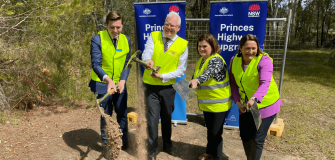Telstra rejects solution to regional Australia’s phone coverage crisis
Share

Telstra has rejected the claims that mandatory mobile roaming would solve regional Australia’s phone coverage crisis.
Nationals leader David Littleproud, whose party has been calling for reform to the universal service guarantee by extending it to mobiles, states that the coverage could be shared between telephone companies so that Australians could get service regardless of their providers.
“In 2023, communication has never been more important,” he said.
“It’s critical as a safety and emergency response, enabling better commerce, business and social interaction in areas of limited network coverage.”
However, Telstra said mandated mobile roaming would deliver worse outcomes for regional Australians because the incentives for providers to invest or innovate in the regions would be removed.
“Telstra has also always supported commercial roaming and other sharing solutions, where providers join forces to deliver better outcomes for customers, without removing the drivers for providers to invest in new and improved coverage,” a Telstra spokesperson said.
The ACCC found mandated mobile roaming unfeasible in 2017, saying it would likely distort the competitive dynamics in the market.
In December, the watchdog struck down a 10-year mobile infrastructure sharing deal with Telstra and TPG Telecom, finding the arrangement would mean less regional infrastructure investment due to a lack of competition.
TPG said the outcome was a loss for regional Australians and the company would take the matter to the competition tribunal.
“Infrastructure sharing will allow more mobile operators to offer their products and services in regional areas, deliver greater choice to regional communities and drive competition,” TPG external affairs general manager James Rickards said.
Telstra said its attempted deal with TPG was an example of its commitment to sharing its network systems for better outcomes in Australia’s telecommunications infrastructure, but not at the cost of competition.
Network operators including Telstra, TPG and Optus have a shared commitment to improving regional network coverage thanks to $875 million in funding from the federal government’s mobile blackspot program.
Despite claiming forced shared roaming would stall regional mobile infrastructure investment, Telstra said it took its obligations under the program seriously and would continue to meet its requirements.
As of October last year, 11 per cent of Australians were “highly excluded” from digital services, meaning they did not have access to or didn’t know how to use online services.
In the October budget, the federal government committed $400 million to expand regional mobile coverage due to the phone coverage crisis.
With AAP
Eliza is a content producer and editor at Public Spectrum. She is an experienced writer on topics related to the government and to the public, as well as stories that uplift and improve the community.






Today’s Pick
11th Annual Aus Goverment Data Summit
April 1, 2025
7th Annual NZ Government Data Summit
May 7, 2025
3rd Public Sector Comms Week
May 14, 2025
Subscribe
We send emails,
but we do not spam
Join our mailing list to be on the front lines of healthcare , get exclusive content, and promos.
AI appointment Australia Australian boost boosts business businesses covid-19 cyber cyber attack cyber security cybersecurity data data breach data management defence Digital employment enhance enhances fraud funding governance government grants infrastructure Innovation Lockdown management new zealand NSW NZ online privacy public Public Sector queensland renewable energy scams security Social Media Technology telecommunications victoria
-

Understanding and building your digital strategy
Digital Government, Opinion
-

Featured Leader: Jamie Morse on multi-channel strategies for communication
Communications, Featured Leader
-

Featured Leader: Tegan Tembe of NSW Treasury on creating solid planning strategies and processes
Featured Leader
-

Wirraka Maya Health Service improves patient care with My Health Record
Learning
Show More-

Effects of ineffective communication in the workplace
Communications, Personal Development
-

7 ways you can enhance your personal development skills
News, Personal Development
-

5 advantages of working in the public sector
News, Personal Development, Professional Development
-

7 causes of communication issues in the workplace
Communications, News, Personal Development
Show MoreLast Viewed